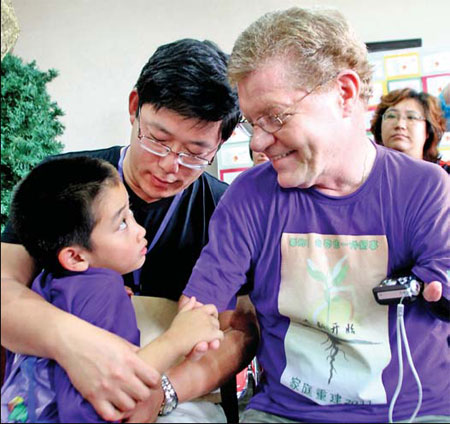Experts call for more support for autism sufferers
 |
|
Qiaoqiao, a 7-year-old autistic child in Dalian, Liaoning province, meets a member of Joni and Friends International Disability Center in the US. Hou Binjiang / for China Daily |
QINGDAO, Shandong - More than 1.5 million children aged under 14 on the Chinese mainland suffer from autism and most have great difficulty accessing proper treatment, experts said on the weekend.
Without timely diagnosis and intervention, many autistic children will miss out on the best opportunities for rehabilitation, said Jia Meixiang, a child psychiatrist with the Peking University Sixth Hospital.
"Some 30 years after the first case was diagnosed in China, the country's capacity to treat autism remains quite limited, which deprives many autistic children of recovery and development," Jia said during an address at the launch of Stars and Their Wishes Autism Alliance for Rehabilitation and Education over the weekend.
The alliance, funded by pharmaceutical multinational AstraZeneca, comprises 29 autism rehabilitation organizations nationwide, mostly privately owned, and aims to increase the sharing of information and educational strategies, improve teachers' skills and create a good rehabilitation environment for the nation's autistic children, said Fang Jing, co-founder of the alliance and head of the Qingdao Yilin Autism Rehabilitation Center.
Currently, China has more than 500 such organizations and at least 80 percent of them were opened by those who have a sufferer in the family, said Wen Hong, vice-chairwoman of the China Association of Persons with Psychiatric Disability and Their Relatives.
"They have great affection and sympathy for these children but their capacity and professionalism need to be greatly improved," Wen said.
No government-recognized standards and guidelines for autism rehabilitation, especially for children, are available in the country, Wen said, adding that supervision of such organizations is loose.
Autistic children, who suffer from serious brain impairment, find it hard to communicate with other people, sometimes for their entire life, experts said.
Although it has no proven cure, hope does exist for autism sufferers as certain therapies and behavioral interventions can help to remedy specific symptoms.
"Given the condition cannot be detected during pregnancy, early diagnosis and intervention really matters," said Wen. "The earlier the intervention the better the results."
A father surnamed Zhao said that his 4-year-old son had improved slightly, particularly in his emotional development, after six months' training at Yilin.
The boy, from the neighboring city of Dezhou, was diagnosed at age 3 and his symptoms included refusing to play with other children, murmuring to himself and rotating objects.
"I'll try my best to give him the training and I hope that his situation will improve so he can live independently in the future," his father said.
Training at Yilin is for both autistic children and their parents, as "behavior intervention and instruction for the children needs to be lifelong to be effective", Fang said.
However, fewer than 10 percent of children affected by the condition can enroll in a normal primary school at the usual school age, she said.
"I dare not think about the future of my son who might need care and support his entire life. Who will do that after my wife and I die?" Zhao said.
Striving for a better outcome, the family left their hometown and went to Qingdao for the training, which costs more than 3,000 yuan ($470) a month.
"Being away from home, where there is no autism rehabilitation center, my wife and I had to quit our jobs and rent a room here to looking after our son," he said.
In fact many parents have similar experiences to the Zhaos', said Wen.
In response, the government began in 2008 to subsidize rehabilitation for autistic children under the age of 7.
Also, care and support for grown-up sufferers is being considered, Wen said.
















